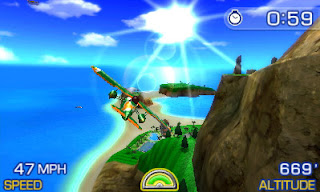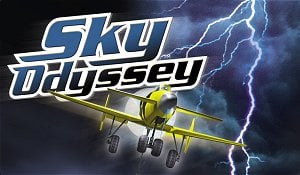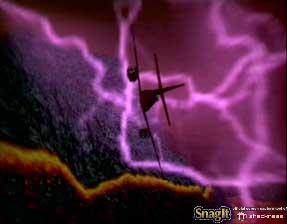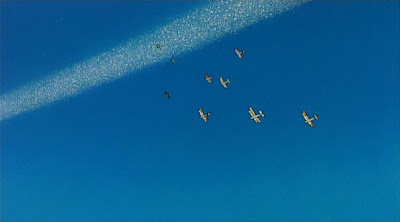Playing Pilotwings Resort this past week has reminded me why I love flying games so much... at least when they get out of my way and let me fly. I never liked flight sims, an unwieldy genre that's more about dials and switches than the joy of aviation. The flying games I love are the ones that strip away all that techno-fetishistic noise and just let you feel how amazing it is to actually fly.
Sky Odyssey is one of the most exciting games I've ever played - a superb action game. It also has a oddly spiritual dimension, a thick sense of human smallness at the edge of an expansive Unknown. It is not, in this sense, unlike two of my other favorite games: Demon's Souls and Shadow of the Colossus, both games that achieve a phenomenal sense of scale and use it to evoke the sublime. It is absolutely no coincidence that the composer for Shadow of Colossus also wrote the music for Sky Odyssey, as the share the same sense of awe for the tiniest of warriors squaring off against Nature's Fury.
The developers of Sky Odyssey do everything in their power to try and convince you that nothing could be more exciting than flying. They throw every conceivable exciting thing that could possible happen to a plane at you, and the earnestness of their romantic vision is so desperate it's almost heartbreaking. They even concoct an elaborate framing narrative to justify their whimsy, something about the last unexplored island on Earth in the twilight of aviation's golden age, when (at least in the minds of Sky Odyssey's makers) there were still some legitimate mysteries left on this planet... and aviators - those amazing men in their flying machines - were the lone explorers of the last frontier.
This brand of nostalgia feels a lot like Hayao Miyazaki, in that it is a Japanese evocation of a romantic 1930/40s centered around flight technology of the era. Porco Rosso is probably the most direct expression of this in Miyzaki's canon, showing a particular love of the pre-war era, an exotic fascination with the West, and a transcendental sense - present in all his work, but most directly expressed in this film - of what it means to fly. I am thinking of the moment when, after being separated from his friends in battle, the protagonist encounters them again above the clouds only to realize they didn't survive after all, but are in fact spirits ascending - still in their planes - to join the rest of the dead in heaven.
Aviation as a concept holds the promise of transcendence, of somehow being able to reach heaven through creative use of technology. Those who know me know I like Kubrick, so take this as you will, but I can't help but think "Sky Odyssey" might be a riff on "Space Odyssey". 2001 is a movie about God made by an atheist. The desire for spiritual transcendence, to commune with forces we don't understand, seems to be a hard-wired human need. Secular attempts to grapple with this, I suppose because of my own atheism, feel a lot more interesting than religious ones... perhaps because religious mythologies are "known", whereas scientific rejection of them lands spiritualism squarely back in the realm of the unknown.














